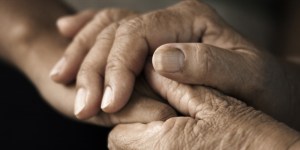Help Aleteia continue its mission by making a tax-deductible donation. In this way, Aleteia's future will be yours as well.
*Your donation is tax deductible!
When a person suffers from a cognitive or neurodegenerative disorder, there may come a point when they are still with us while not be able to be fully present. They will no longer seem like the person we once knew. In such cases, caregivers will face emotional challenges that are very similar to feelings of mourning.
It’s “a very painful situation,” says Dr. Véronique Lefebvre des Noëttes. She’s a psychiatrist and member of the biomedical ethics research department at the Collège des Bernardins. “The relatives of the patient concerned are forcefully drawn into a period of mourning which is difficult to call by that name. We must mourn a person who is still alive, saying goodbye not only to the loved one but also the life we led until then, the projects we shared with them, and everything that we must rebuild throughout this new situation ...”

Mourning in anticipation
This long period of disintegration of the relationship can last for many years. Death, when it occurs, “can of course bring a form of relief,” underlines the psychiatrist. “(It) is authentic mourning that is experienced in anticipation (of physical death), and this relief is entirely legitimate. It’s absolutely necessary to relieve caregivers of the guilt surrounding this form of remorse.”
These feelings of mourning can, at least partially, follow the stages described by Elisabeth Kübler-Ross, a pioneering psychiatrist in palliative care. “Anger when the diagnosis is announced, bargaining, depression, and finally, acceptance are all stages that can follow one another in the same day,” says Dr. Lefebvre des Noëttes.
Testimonies
Lina is a woman whose uncle now suffers from cognitive and neurological disorders triggered by long-term alcoholism. She is experiencing the pain of loss. The disease damaged his hippocampus, which is the part of the brain that deals with cognition, memory, learning and spatial orientation. “It’s irreversible,” she says. “At 73, he was admitted a few months ago to a specialized institution. He has since suffered from dementia and has become completely dependent.” This has led to a long period of mourning for his loved ones, who remember him as a brilliant and very active businessman.
The hardest part was letting go of all our projects.
Similarly, Marie lost her mother a few months ago after a long neurodegenerative disease. It was similar to Alzheimer’s disease but was never diagnosed, and which lasted a little over seven years:
Mom went from having psychological symptoms, like mood swings and aggression, to losing her motor skills almost completely. In her last years, she was in a state of total absence, with a few moments of lucidity during the day, without being able to communicate. I didn’t immediately realize that I was experiencing mourning, even if the shock was very abrupt when I understood that the nature of a neurodegenerative disease meant that everything she was losing would never come back again.
Moved, Marie remembers these long years of supporting and losing her mother.
The hardest part was letting go of all our projects. My mother was still alive when I got married and when I got pregnant, but mentally she was already gone. She was never the grandmother I wanted for my children, and I was unable to share any of these major stages of my life with her, even while she was still there.
When the diagnosis is your own
If we talk about grief and mourning in relation to those close to a patient, can we ourselves be confronted with it for ourselves, at the announcement of a diagnosis which puts us face to face with our own death or loss of neurological faculties? The psychiatrist replies:
The question arises. This is the case, for example, with Charcot disease, or amyotrophic lateral sclerosis (ALS). The patient, when they are told of the illness that is affecting them, is often quite young, since ALS generally occurs between the ages of 45 and 65. They often revolt immediately in the face of the incredible violence of the patient's clinical evolution: the body becomes paralyzed, while the mind remains healthy. Only love, then, saves the sick and allows them to regain the taste for living.

Alzheimer’s patients are confronted with another phenomenon: anosognosia, “that is to say, a reduced, or absent, awareness of the disorders linked to the disease. The patient, then, doesn’t recognize himself as ill. You should know that contrary to what we think,” underlines Dr Lefebvre des Noëttes, “denial is not necessarily a bad thing: it’s a protection mechanism of the brain, which has a real therapeutic value, although it is involuntary.”
Caregivers need care
The psychiatrist emphasizes that although there tend to be recognizable stages of mourning, there is no right or wrong way to mourn, and for some people it is more intense than for others. “Mourning is a process similar to depression which can lead to the loss of the will to live.” Coping with loss requires time, along with the experience of moving between grief and acceptance, until hopefully we one day realize that we no longer cry at the mere mention of our loved one's name.
“It’s imperative that caregivers learn how to get help,” insists Dr. Lefebvre des Noëttes. “They aren’t the only ones who can support their sick loved one: they too must be supported on a psychological, psychiatric and spiritual level.”










